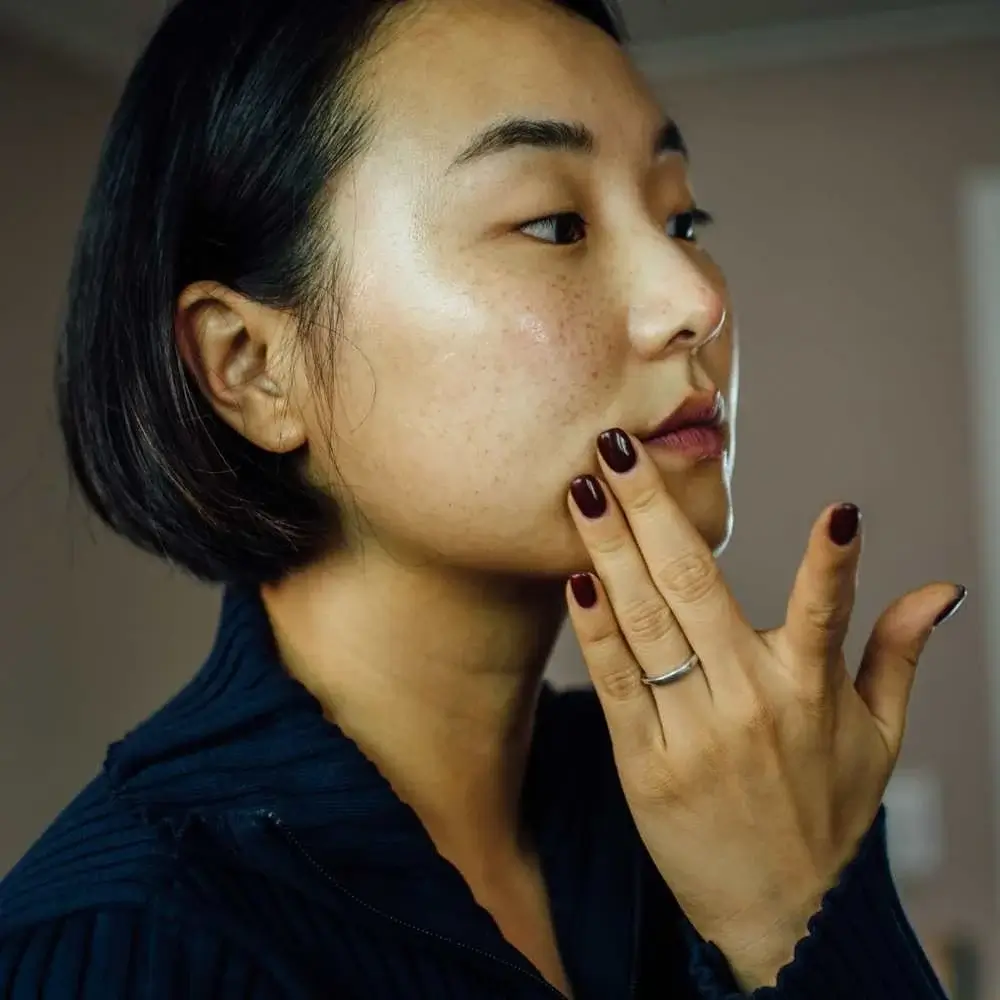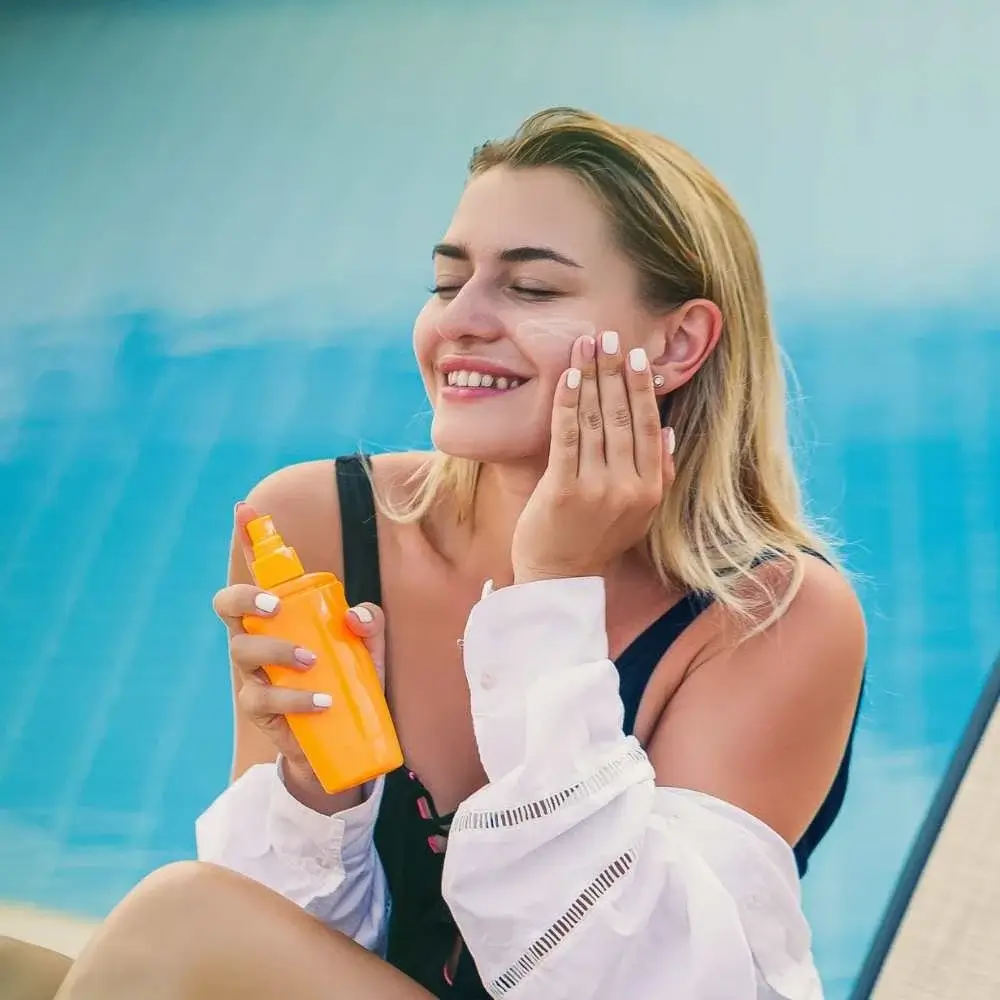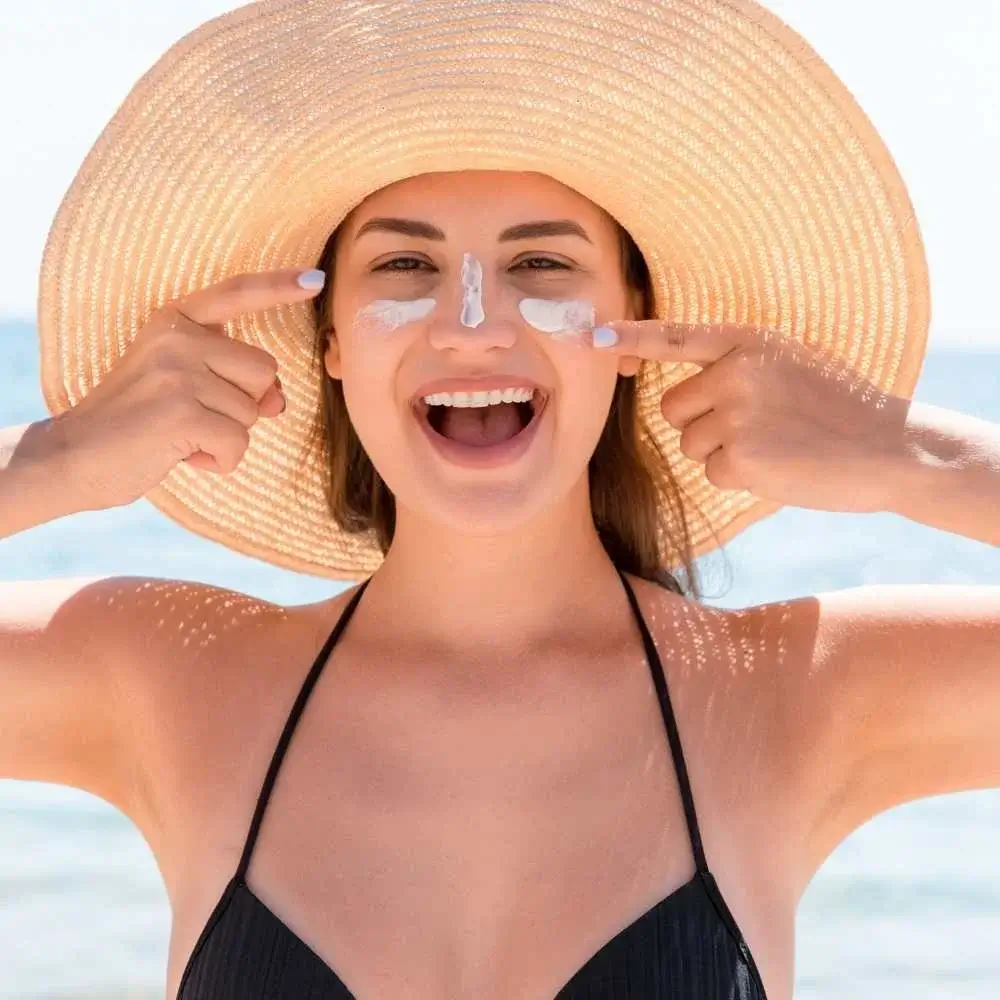Today, we're diving into the world of sunscreens, particularly for those of us blessed with acne-prone skin. Ever felt like finding the perfect sunscreen is like trying to find a needle in a haystack? Well, fret no more, because we've got you covered!
We've scoured the internet, sifting through countless reviews, ratings, and dermatologist recommendations to bring you the crème de la crème of sunscreens for acne-prone skin. Spoiler alert: EltaMD UV Clear Broad-Spectrum SPF 46 and Neutrogena Clear Face Breakout Free Liquid Lotion are some of the top contenders! But why stop at one or two when we have a whole list waiting for you?
From oil-free formulas that won't clog your pores to broad-spectrum protection that shields you from harmful UVA and UVB rays, these sunscreens are the BFFs your skin has been longing for. Perfect for everyday use, they're designed to sit comfortably under makeup without leaving a greasy residue or causing breakouts.
So, if you're ready to step into the sunlight with confidence and kiss goodbye to sunburn and acne, keep reading. Your future (sun)shine-filled, acne-free days await!

Sun-Kissed, Not Sunburnt: Your Acne Prone Skin's BFF - Sunscreen!
We all love a bit of sun-kissed glow, don't we? But our skin, especially the acne-prone ones, might not share the same enthusiasm. The skincare gurus have spoken - slather on that sunscreen even if you're just chilling at home. Why, you ask? Let's dive in!
The Sunscreen Saga: A Tale of Clear Skin
Sunscreen is like the superhero of your skincare routine, fighting off the villainous UV rays that are out to give you wrinkles and speed up aging. But here's the plot twist - it also helps keep those pesky acne breakouts at bay! Sun exposure can send your acne into overdrive by increasing inflammation and promoting bacteria growth. A broad-spectrum SPF 30 sunscreen is your shield, come rain or shine, cloudy or sunny!
Finding Your Skin's Sunscreen Soulmate
The sunscreen aisle can feel like a maze, right? Fear not, we're here to guide you! If your skin is acne-prone, oil-free and non-comedogenic formulas are your best bet. They won't clog your pores or contribute to breakouts. Got sensitive skin? Go for physical blockers like zinc oxide or titanium dioxide instead of chemical ones. They're like the gentle giants of sun protection!
Sun-Safe Hacks for Acne Prone Skin
Sunscreen is just part of the story. To truly protect your skin, seek shade whenever you can, especially between 10am and 4pm when the sun is at its meanest. Dress to protect with hats and long sleeves if you're planning an outdoor adventure. And don't forget to reapply your sunscreen every two hours, or more if you're swimming or sweating!
Wearing sunscreen is like signing a pact to protect your skin from the sun's harmful rays—especially important if you're battling acne. Remember to pick an SPF 30 or higher, broad-spectrum, oil-free and non-comedogenic formula. Along with daily application, find some shade and dress appropriately when outdoors during peak sunshine hours. With these easy-peasy steps, you'll be on your way to a healthy, glowing complexion!
And because we love you, we've done some digging to find the best sunscreen for acne-prone skin. Say hello to your new beauty essential! Click the link to get your hands on our top pick for the best Sunscreen for Acne Prone Skin. Trust us, your skin will thank you!

The Crucial Role of Sunscreen for Acne-Prone Skin
Let's delve into a story. Picture yourself strolling on a sun-drenched beach, feeling the warm sand between your toes. As the golden sun beats down, you slather on sunscreen, not just to protect against painful sunburns, but also because you have acne-prone skin. This is not any random choice of skincare; it's a conscious decision backed by science and dermatologists worldwide.
The importance of sunscreen for acne-prone skin cannot be overstated.
Why so? You may ask.
Well, contrary to popular belief, sun exposure doesn't help clear up acne. In fact, it can potentially make it worse. When your skin gets exposed to the harsh UV rays, it responds by producing more sebum, an oily substance that can clog pores and lead to breakouts.
Now, imagine this.
You're at the beach again, but this time, you've forgotten your sunscreen. By evening, you notice your skin looking red, feeling painful, and the acne seems to have flared up. That's the power (or rather, the wrath) of the sun on unprotected, acne-prone skin.
Here's an interesting fact: Sunscreen does more than just prevent sunburns. It plays a vital role in maintaining overall skin health, especially for those with acne-prone skin. It shields your skin from harmful UV rays, which can cause premature aging, hyperpigmentation, and yes, worsening of acne.
Choosing the best sunscreens for acne-prone skin can help reduce inflammation and prevent new blemishes from forming. Plus, many sunscreens today come with additional benefits, such as hydration and skin repair, making them an essential part of your daily skincare routine.
In essence, the best sunscreens for acne-prone skin are not just shields; they're powerful allies in your battle against acne. So, the next time you step out, don't forget your armor - your chosen sunscreen. Because every day is a sunny day when it comes to protecting your skin.
Stay tuned as we dive deeper into how to choose the right sunscreen for acne-prone skin, its benefits, and our top recommendations in the upcoming sections. Remember, your skin is unique, and so should be your choice of sunscreen.

The Paradox of Sun Exposure and Acne
Sunlight, the giver of life, may not be so kind to those with acne-prone skin. It's a common myth that sun exposure can help clear up acne. However, the reality is quite the opposite.
When your skin is exposed to the sun, it tends to dry out. While this may seem like a good thing for oily, acne-prone skin, it's not. In response to this dryness, your skin compensates by producing more sebum or oil. This excess sebum can clog your pores, leading to an increased risk of breakouts.
In other words, sun exposure can actually worsen acne.
But that's not all.
Sun exposure can also cause inflammation, which can make existing acne look redder and more prominent. Plus, the UV rays from the sun can darken acne scars, making them more noticeable.
So, what does this mean for those with acne-prone skin?
It means that protection from the sun is crucial. And that's where the best sunscreens for acne-prone skin come into play.
Why Sunscreens Are Crucial for Acne-Prone Skin
Sunscreens are not just about preventing sunburns. They play a vital role in maintaining overall skin health, especially for those with acne-prone skin.
The best sunscreens for acne-prone skin do more than just shield your skin from harmful UV rays. They can also help reduce inflammation and prevent new blemishes from forming. Plus, many sunscreens today come with additional benefits, such as hydration and skin repair, adding more reasons to make them a part of your daily skincare routine.
In essence, the best sunscreens for acne-prone skin are not just shields; they're powerful allies in your battle against acne.
Choosing the Best Sunscreens for Acne-Prone Skin
When it comes to choosing the best sunscreens for acne-prone skin, there are a few factors you need to consider.
First, look for sunscreens that are non-comedogenic, meaning they won't clog your pores.
Second, opt for sunscreens with a high SPF (Sun Protection Factor) to ensure maximum protection against UV rays.
Third, choose sunscreens that are oil-free and lightweight. These formulations won't leave your skin feeling greasy or heavy, which is a big plus for those with acne-prone skin.
When it comes to protecting your skin, every day is a sunny day. So, don't forget your armor - your chosen sunscreen. Because in the battle against acne, the best sunscreens for acne-prone skin are your greatest allies.

Unveiling the Benefits of Sunscreen in Reducing Acne Breakouts
The best sunscreens for acne-prone skin do more than just ward off harmful UV rays. It's like having a secret weapon that not only guards your skin but also aids in your fight against acne.
Sounds surprising?
Let's delve deeper into how sunscreen can actually help reduce acne breakouts.
Firstly, sunscreens create a protective barrier on the skin's surface, preventing environmental pollutants from clogging your pores. Remember, clogged pores are one of the primary causes of acne breakouts.
Secondly, many of the best sunscreens for acne-prone skin are formulated with ingredients that have anti-inflammatory properties. These ingredients can help reduce the redness and inflammation associated with acne, making existing blemishes less noticeable.
Thirdly, certain sunscreens come packed with hydrating ingredients like hyaluronic acid. Now, you might wonder, "Why would I need hydration if I have acne-prone skin?" Well, keeping your skin adequately hydrated can actually help regulate sebum production, thereby reducing the chances of breakouts.
But the benefits don't stop there.
Regular use of sunscreen can also prevent post-inflammatory hyperpigmentation, commonly known as acne scars. Sun exposure can darken these scars, making them more noticeable. By shielding your skin from the sun, you're also preventing these scars from becoming a permanent feature on your face.
In essence, using the best sunscreen for acne-prone skin is like hitting two birds with one stone - you're protecting your skin from sun damage while actively fighting off acne.
So, the next time you step out, make sure to apply your armor - your chosen sunscreen. Because when it comes to combating acne, every bit of protection counts. And the best sunscreens for acne-prone skin offer more than just protection; they offer a way to clearer, healthier skin.

Unlocking the Secrets of Sun Protection: Top FAQs About the Best Sunscreens for Acne-Prone Skin in 2023
Can wearing sunscreen help with acne?
Absolutely, sunshine! While sunscreen might not directly zap those zits away, it's an undercover agent in your acne-fighting squad. Here's the lowdown: sun exposure can inflame your skin and clog your pores, turning them into a playground for acne-causing bacteria. Not the kind of party you want to host, right? That's where sunscreen swoops in to save the day! A good, broad-spectrum SPF 30 or higher sunscreen, like EltaMD UV Clear Broad-Spectrum SPF 46 or Neutrogena Clear Face Breakout Free Liquid Lotion, helps protect your skin from these harmful effects. They're oil-free and non-comedogenic, meaning they won't clog your pores or cause breakouts. So, while sunscreen might not be a direct acne treatment, think of it as your skin's dapper bodyguard, keeping trouble (read: UV rays and inflammation) at bay. Now, that's a job well done, don't you think?
Can sunscreen remove dark spots?
Well, let's spill some tea on this, shall we? While sunscreen might not have the magical powers to erase those pesky dark spots overnight, it's a crucial player in preventing them from getting darker. Here's how it works: those dark spots are often caused by hyperpigmentation due to sun damage. Sunscreen, our skin's knight in shining armor, provides a protective shield against harmful UV rays, preventing further darkening of existing spots.
But wait, there's more! Some sunscreens, like EltaMD UV Clear Broad-Spectrum SPF 46, are loaded with niacinamide, a superstar ingredient known for its skin brightening properties. So while it's not directly fading those spots, it's aiding in the process. Neutrogena Clear Face Breakout Free Liquid Lotion is another great pick for acne-prone skin, and it's as gentle as a lullaby!
So, in essence, while sunscreen isn't a magic eraser for dark spots, it's one of your best defenses in managing them. Think of it as your loyal sidekick in your journey towards even-toned skin. Now, who wouldn't want that?
Is sunscreen good for oily skin and acne?
Oh, honey, let's dive right into this pool of knowledge! If you're thinking that sunscreen is just another layer of grease on your already oily skin, it's time to flip the script. The truth is, not all sunscreens are created equal. Some are indeed oily, but there are others that are as light as a feather and won't add any extra shine to your glow.
For our oily skin comrades, mineral sunscreens like La Roche-Posay Anthelios Ultra-Light Mineral Sunscreen SPF 50 and CeraVe Ultra-Light Moisturizing Lotion SPF 30 are your new best friends. These sunscreens use ingredients like zinc oxide and titanium dioxide to physically block the sun's rays and they're non-comedogenic, which means they won't clog your pores or spark a breakout party on your face.
So, yes, sunscreen can be a total game-changer for oily and acne-prone skin. It's like having an invisible shield that not only guards against harmful UV rays but also keeps your skin looking fresh and breakout-free. Now, isn't that just the kind of multitasking we all need?
How much SPF is good for oily acne prone skin?
Oh, darling, let's talk numbers and sun protection! When it comes to SPF (Sun Protection Factor), more is always merrier. For our oily, acne-prone skin buddies, dermatologists recommend using a sunscreen with at least an SPF of 30, which blocks about 97% of UVB rays.
But wait, here's the real kicker: The level of SPF isn't the only thing you should be looking at. What you really want is a "broad-spectrum" sunscreen, like La Roche-Posay Anthelios Ultra-Light Mineral Sunscreen SPF 50 or CeraVe Ultra-Light Moisturizing Lotion SPF 30. These sunscreens are MVPs because they protect against both UVA (aging) and UVB (burning) rays.
And remember, no matter how high the SPF, reapplication every two hours is key! Think of it as a hydration break for your skin, but instead of water, you're serving up some top-notch UV protection. Now, doesn't that sound like a well-spent beauty minute?
Will sunscreen clog pores?
Oh, the drama of clogged pores! It's like a badly written soap opera that no one asked for. But fear not, dear reader, because not all sunscreens are pore-clogging villains. In fact, many are downright heroes when it comes to protecting your skin without causing breakouts.
Enter the world of non-comedogenic sunscreens, like EltaMD UV Clear Broad-Spectrum SPF 46 and Neutrogena Clear Face Breakout Free Liquid Lotion. These beauties are specifically designed to not block your pores or cause acne. They're like the good guy in the movie who always does the right thing - keeps you safe from harmful UV rays without causing any unnecessary drama on your skin.
So, will sunscreen clog pores? Not if you choose the right one! And with these non-comedogenic options, you can have your sun protection and clear skin too. Now, isn't that a happy ending we can all get behind?
Read our article about best natural shampoo for men here!
Read our article about best shampoo for bleached hair here!
Read our article about best cruelty free lipstick here!







